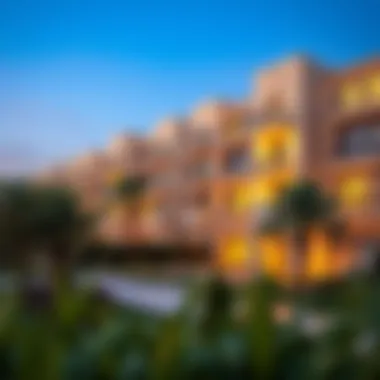Understanding the Costs of Residency in the UAE


Intro
Navigating the intricacies of residency costs in the United Arab Emirates is not something just anyone can grasp easily. It’s a unique landscape with its own set of rules, regulations, and expenses. Whether you’re looking to move your family or invest in a property, understanding the financial commitments is fundamental. This article aims to shed light on the multi-faceted aspects that determine the cost of living in this affluent Gulf nation.
The UAE, particularly cities like Dubai and Abu Dhabi, stands out as a booming hub attracting talent from across the globe. The appeal often comes with a price tag, making it essential to dig deeper into what that tag includes. Factors at play range from government fees for visas and permits to the daunting landscape of housing and everyday living costs.
In this discussion, we will explore critical components such as visa fees, accommodation expenses, and additional living costs that prospective residents and investors should prepare for. Understanding these elements will better equip you to make informed decisions in the context of your lifestyle or investment goals.
Property Trends in Dubai
Current Market Dynamics
Dubai's property market has been undergoing a tumultuous but interesting phase, influenced by both global economic conditions and local regulations. As of late, the trend leans heavily towards off-plan developments, where buyers are purchasing from blueprints.
- Buyer’s Market: With a surged supply of properties, buyers often have the upper hand, negotiating lower prices and better payment plans.
- Rental Rates Fluctuation: In various areas, rental prices have seen ups and downs. Some neighborhoods, previously considered out of reach, are now offering more competitive rates.
Dubai has always been known for its luxury offerings, but an evolving focus on affordable housing is becoming more evident. It clarifies the intention of the government to cater not only to the luxury segment but also to those entering the market for the first time.
Emerging Neighborhoods and Areas of Interest
For those eyeing a nest in Dubai or investment options, certain neighborhoods are emerging as hot spots worth keeping an eye on:
- Jumeirah Village Circle (JVC): Once overlooked, this area is now gaining recognition for its affordability amidst quality living environments.
- Dubai South: A project that encapsulates the vision of the future with ample space for residential units and commerce, ideal for families and businesses alike.
- Al Furjan: Known for its family-friendly vibe and good amenities, it offers a more tranquil lifestyle in contrast to the bustling city center.
These neighborhoods usually boast a lower cost of living while still providing essential amenities and a vibrant community lifestyle.
Investment Insights
Key Factors Influencing Real Estate Investments
Investing in UAE property does not merely reflect the current trends. Several factors play a crucial role in determining potential returns:
- Regulatory Environment: Understanding the laws governing expatriate buying and leasing is vital. Staying updated with changes can prevent unforeseen surprises down the line.
- Economic Trends: Always consider the overall economic environment; fluctuations can either propel or stall property values.
- Infrastructure Developments: New projects often indicate future growth, making them optimum for long-term investments.
Tips for First-Time Investors
Starting in UAE’s real estate market can seem overwhelming. Here are a few tips to ease your journey:
- Research: Always do your homework. Knowledge is your best friend when weighing options.
- Start Small: Consider buying a smaller property or entering with a co-investor to mitigate risks.
- Engage Professionals: A local agent with in-depth knowledge can be invaluable.
- Stay Hospitality-Focused: Properties that cater to tourism, like vacation rentals, are usually high in demand and offer good returns.
Focus on these elements not only provides clarity but also opens up a pathway in managing the financial aspects that come with establishing residency in the UAE.
"Investing in property is always about thinking long term. Focus on what the neighborhood will look like five years from now; that’s where your real gains lie."
Overview of Residency in the UAE
When we talk about moving to the United Arab Emirates, we’re not just discussing a relocation. There are layers to unpack regarding the costs associated with residency. Understanding the intricacies of residency permits is paramount, especially for investors and homebuyers who eye this bustling market. This section sets the foundation for a comprehensive understanding of what it truly means to call the UAE home.
Residency in the UAE offers not just a change of scenery, but a gateway to a vibrant economy and an affluent lifestyle. Moreover, obtaining residency isn’t merely a paperwork exercise; it carries substantial implications. An individual becomes part of a dynamic community, benefiting from the diverse cultural tapestry and the myriad of opportunities available. The residency permit serves as a key document—it allows one to enjoy legal employment, access to local services, and the chance to invest in real estate.
Significance of Residency Permits
Residency permits in the UAE function as more than just formalities; they lay the groundwork for a myriad of advantages. The significance of these permits cannot be overstated. For instance, they enable expats to work legally within the country. Without a valid residency permit, engaging in employment activities can lead to hefty fines and legal troubles, something no one wants on their record.
Furthermore, a residency permit opens doors to myriad services: from banking to healthcare. Getting a local bank account often requires proof of residency, which brings forth another layer of essentiality to these permits. The expat community in the UAE also thrives on connectivity; being a resident means being part of social networks and groups that can ease transitions.
Think of residency permits as your ticket to unlocking various opportunities. As one expat aptly put it, "Getting my residency was like finally getting a VIP pass in the UAE." This sentiment encapsulates the collective feeling among many who took that step.
Common Types of Residency Visas
In the UAE, not all residency visas are created equal. There are several types tailored for different categories of residents. Understanding these can help in making well-informed decisions, aligning with one’s long-term goals.
- Employment Visa: This is one of the most common types. Tailored for those looking to work in the UAE, it typically requires sponsorship from an employer.
- Investor Visa: For those wishing to invest in properties, this visa can provide a pathway toward residency based on the amount invested.
- Family Visa: Many expats bring their families along, which often requires a family sponsorship visa. This can span spouses and children, facilitating familial setups.
- Retirement Visa: A relatively newer entry in the visa lineup, it caters to those looking to retire in the UAE, provided they meet specific financial criteria.
Each type has its own set of prerequisites and processes, which can sometimes feel a tad labyrinthine. But proper understanding ensures that you have a clear direction without unnecessary delays, making the entire residency acquisition process smoother. Whether you're an investor contemplating property or an individual positioning for employment, identifying the right residency visa is crucial to navigating the UAE’s diverse landscape.
Visa Costs Analysis
Understanding the costs associated with residency in the UAE begins with the examination of visa fees. This aspect is crucial for anyone considering relocating or investing in this vibrant country. The implications of visa costs are broad, as they represent not just a financial obligation but also set the stage for one’s experience in the UAE.
Navigating through the various visa categories, each with its own fee structure, is paramount. The fees can often dictate choices regarding residency type—whether it be a long-term visa backed by employment or something more transient like a tourist visa. Therefore, grasping this part provides insights into the economic landscape while paving the way to informed decisions.
Application Fees for Different Visa Types
The application fees for residency visas in the UAE can vary significantly based on several factors like the visa category and the applicant’s nationality. For example, a standard employment visa, typically tied to a job offer, might cost around 3,000 AED. In contrast, the family sponsorship visa could rise to about 5,000 AED. Application fees often include the costs for paperwork and processing, which can add hidden expenses.
Moreover, some categories, like investor visas, have not only higher fees but also require additional documentation, leading to more intricate financial commitments. It’s worth noting that government policies change over time, potentially affecting these charges. Here’s a brief breakdown of common visa applications:
- Employment Visa: Approximately 3,000 AED
- Family Sponsorship Visa: Around 5,000 AED
- Investor Visa: Can exceed 10,000 AED
This variability can affect potential residents' overall budgeting. For those eyeing residency through investment avenues, the financial implication is a major consideration, influencing the overall perception of living and working in the UAE.


Renewal Costs and Associated Fees
Annual renewal costs present an additional layer of financial responsibility when it comes to residency in the UAE. After the initial visa application is processed, residents must bear in mind that the renewal process isn’t just a formality; it also has its costs associated with it. Renewal fees can be comparable to or even exceed initial application costs.
Typically, the standard renewal fee might hover around 2,500 AED for most residency categories. However, specific conditions such as penalties for late renewals could exacerbate these costs. If, for any reason, a visa is expired and requires an urgent renewal, an express fee might apply, further increasing the expense. This adds an element of urgency to keeping documents up-to-date.
Additionally, some visas result in a need for health insurance renewal, which is a mandatory requirement for all expatriates in the UAE, further elongating the financial list. Keeping track of these fee structures is essential for new residents. Planning ahead can provide budgeting benefits and prevent any potential financial surprises down the road.
"Knowing the total costs of residency can ensure a smoother transition into UAE life, avoiding financial hiccups that could complicate your experience."
In summary, having a firm grasp on the application fees and renewal costs related to residency visas establishes a foundation for understanding the broader financial implications of settling in the UAE. Careful consideration and planning are vital to fully embracing life in this dynamic and multifaceted country.
Accommodation Expenses
Understanding accommodation expenses is crucial for anyone looking to establish themselves in the UAE. This section brings into the spotlight the financial implications of housing choices within the region, recognizing that the type of accommodation one selects can significantly impact overall living costs. Housing represents one of the largest slices of the budget pie, hence prospective residents or investors need a clear grasp of these expenses to make informed decisions.
Rental Market Overview
The rental market in the UAE, particularly in cities like Dubai and Abu Dhabi, is both vibrant and complex. Over the past decade, it has witnessed substantial growth, influenced by various factors including economic shifts, demand from foreign investors, and evolving residential trends. The surge in expatriates choosing the UAE as their home fuels demand in the rental market, often resulting in competitive pricing.
Most properties are offered as unfurnished or furnished rentals. A one-bedroom apartment in central Dubai might cost around AED 6,000 to AED 12,000 per month, depending on location and property amenities. Meanwhile, in Abu Dhabi, similar accommodations generally range from AED 5,000 to AED 9,000, reflecting the varying landscape of housing supply and demand across emirates.
Factors Influencing Rental Costs
Several elements come into play when determining rental rental costs in the UAE:
- Location: Proximity to business districts, schools, and amenities can inflate price listings significantly.
- Property Size and Type: Larger residences or those with luxury finishes like swimming pools or gyms generally demand higher rents.
- Market Trends: Seasonal fluctuations, such as peak tourist seasons or international events, can sway rental costs, making it essential to monitor market trends.
- Duration of Lease: Signing longer leases often garners lower monthly rates, offering some financial reprieve.
Understanding these factors is essential for crafting a budget that accommodates housing costs effectively.
Comparative Analysis of Renting vs. Buying
When weighing the options between renting and buying property in the UAE, various considerations surface, each carrying its own set of advantages and disadvantages.
Renting offers flexibility, particularly for those new to the UAE who might not want to commit long-term. It also shields tenants from property maintenance worries, as landlords typically handle repairs. However, consider the potential hidden costs of renting, such as agency fees and deposits, which can pile up quickly.
On the flip side, buying property can be a sound long-term investment, especially in an increasingly stable property market. With property values showing upward trends in many areas, homeowners can benefit from capital appreciation over time. Nevertheless, buyers must also navigate significant upfront costs, including down payments, property registration fees, and maintenance costs, which can be daunting.
To summarize, both renting and buying have their merits; the choice hinges on individual financial situations and housing goals.
"Ultimately, whether you rent or buy, understanding the landscape of accommodation expenses in the UAE is imperative for achieving a sustainable living experience."
For further insights on the UAE rental market, one might find Dubai Land Department and Abu Dhabi Municipality useful resources.
Living Expenses Beyond Rent
Living in the UAE can be a vibrant experience, but it comes with costs that go beyond just the roof over your head. In this section, we delve into the various expenses that residents should anticipate. These expenses include utility bills, transportation costs, groceries, and more. Understanding these factors is crucial for effective budgeting and ensuring a comfortable lifestyle in a new country. Thorough knowledge of living expenses not only prepares you financially but also helps set realistic expectations for your quality of life in the UAE.
Utility Bills: An Overview
Utility bills in the UAE represent a significant component of living expenses. It's not just about keeping the lights on or having access to water; understanding how each utility charges and its impact on your overall budget is essential.
- Electricity: This can fluctuate substantially depending on the season. Air conditioning might be your best friend during the sweltering summer months, but it could also be responsible for hefty bills. Average monthly costs can vary from AED 300 to AED 900 based on usage.
- Water: Water charges are generally lower, averaging around AED 200 a month. However, beware of overuse; the bills can surprise you.
- Internet and Phone: Connectivity is vital, especially in a digital world. Most providers offer packages between AED 200 and AED 500, depending on the speed and additional services.
Wit all of these, calculating utilities could take a chunk of your monthly budget, so it's wise to keep an eye on your usage.
Transportation Costs in the UAE
Getting around in the UAE involves a mix of public transport and private travel options. Familiarizing yourself with these can enhance your daily routine without breaking the bank.
- Public Transport: The metro is a popular choice, especially in cities like Dubai. A single journey could cost about AED 2.5 to AED 7, depending on the zones you travel through. Monthly passes may range around AED 300, which is a fantastic deal for regular commuters.
- Taxi Services: Taxis are readily available but can get pricey. The starting fare is generally AED 12, with additional charges per kilometer. If you're not careful, these can add up quickly.
- Car Ownership: If you prefer driving, remember to take into account fuel prices, insurance, and parking costs. Fuel prices hover around AED 2.7 per liter, adding a notable expense to your budget.
Groceries and Consumables Pricing
Grocery shopping in the UAE can be both a delight and a hurdle, depending on where you shop and what you’re looking for.
- Supermarkets: Well-known chains like Carrefour and Lulu Hypermarket offer a wide variety of products, including imported goods. Expect to spend anywhere from AED 800 to AED 1,500 per month for groceries, depending on family size and lifestyle choices.
- Local Markets: These can be a treasure trove of fresh produce at more competitive prices. Shopping at local markets also supports local farmers and businesses, which can be quite fulfilling.
It is important to plan your shopping around promotions and discounts to save some dirhams here and there!
Navigating these costs ensures you are well-prepared as you thrive in the UAE's dynamic environment. By understanding living expenses beyond rent, you can make informed decisions that align with your financial goals.
Healthcare Costs
Healthcare costs play a significant role when considering residency in the UAE. Understanding these costs is crucial as it affects not only the overall budget but also the quality of life for expatriates. The UAE is known for its state-of-the-art healthcare systems, but this level of service comes with its own pricing structure that residents need to be aware of. Navigating the healthcare landscape, including health insurance requirements and average medical expenses, is essential in ensuring a smooth transition into life in the UAE.
Health Insurance Requirements
Health insurance in the UAE is not just a luxury; it is a necessity. In fact, expats are required by law to have health insurance coverage reflecting the country's larger commitment to public health. Every emirate has its own stipulations regarding the minimum coverage required. For instance, Abu Dhabi mandates a health insurance plan that covers various services, including both outpatient and inpatient expenses. This is to ensure that all residents have access to necessary medical care.
Furthermore, health insurance must be obtained privately or through an employer, and it can vary widely in terms of coverage, exclusions, and premiums. The average annual premium can range widely—around 3,000 to 10,000 AED ($816 to $2,700), depending on the level of coverage selected.
When considering health insurance, individuals often need to weigh the pros and cons of different options, evaluating factors such as family coverage, the network of hospitals, and policy inclusions. The cost of health insurance shouldn’t be overlooked, as it can represent a considerable portion of one's monthly budget.


Average Medical Expenses in the UAE
While health insurance covers a significant chunk of medical expenses, understanding the landscape of costs outside insurance coverage is equally important. The average medical expense obtained in the UAE can be quite different compared to many other countries. For a consultation with a general practitioner, you might shell out anywhere from 300 to 600 AED ($82 to $163). Specialty consultations often come in at a higher price, usually ranging from 500 to 1,200 AED ($136 to $327).
In addition to consultations, prices for medical procedures can vary significantly. For instance, a simple blood test could run anywhere from 100 to 300 AED ($27 to $82), while more complex tests or examinations can escalate quickly, depending on the facility and the complexity of the tests. Surgical procedures also bring a range of costs, stretching from several thousand AED for minor operations to tens of thousands for major surgical interventions.
The UAE's healthcare system is robust, yet being prepared for out-of-pocket medical costs is just as important as obtaining health insurance.
To summarize, healthcare costs in the UAE—especially in terms of health insurance requirements and average medical expenses—demand careful attention from prospective residents. Being informed not only enables easier transition into life in the UAE but also fosters better financial planning for newcomers and expat families.
Education and Childcare Expenses
When considering a move to the United Arab Emirates, one of the significant aspects that potential residents must grapple with is the cost of education and childcare. This topic isn't just a n internal discussion; it holds considerable weight in financial planning, especially for expatriates who often juggle their children's educational needs while managing the intricacies of living in a foreign country. With a diverse population and myriad choices, understanding the landscape of educational expenses is essential for families.
Private School Tuition Fees
Education in the UAE, particularly in cities like Dubai and Abu Dhabi, largely centers around private institutions which are known to provide a curriculum that caters to various educational philosophies and nationalities. For many international families, selecting a private school can be a bit like navigating a maze—costly and confusing, yet critical to their children's futures.
The average tuition fees range significantly across different schools, but on average, parents can expect to pay anywhere from AED 20,000 to AED 100,000 per year. The factors that influence these costs include:
- Curriculum Type: Schools offering American, British, or International Baccalaureate (IB) programs generally have higher fees.
- Reputation and Accreditation: Well-established institutions often charge a premium due to their history and standing among locals and expatriates alike.
- Location: Schools that are situated in prime areas tend to be more expensive.
For parents, it is vital to explore what each school includes in their tuition. Some fees may cover books and uniforms, while others might charge separately, leading to unexpected costs. Be prepared for other components that can add up quickly.
Educational Options for Expats
The UAE provides a wide array of educational opportunities tailored for expatriate families, with options ranging from British to American curriculums, and even alternative educational models such as Montessori or Waldorf.
When sifting through these choices, consider the following aspects:
- Cultural Fit: It is advisable to select a school that aligns not just academically but culturally, ensuring your child feels at home.
- Diverse Student Body: Multi-national schools foster an environment of inclusion, which is particularly beneficial for expatriate children adjusting to a new culture.
- Extracurricular Activities: A school that offers a robust extracurricular program can significantly enhance your child's learning experience, providing opportunities for growth beyond academics.
It's wise to visit prospective schools and engage in conversations with faculty and even current parents. Getting a sense of the community can provide invaluable insights that tuition fees alone won't reveal.
Cultural and Leisure Costs
When considering residency in the UAE, cultural and leisure costs can significantly influence the overall living experience. The vibrant tapestry of life in the UAE is woven with its rich blend of traditions and modernity, making this a unique place to reside. Understanding these costs is vital for prospective residents and investors alike, as they contribute not only to quality of life but also to the broader economic landscape of the country.
Residents often find that engaging in cultural activities such as visiting museums, art galleries, and local festivals enhances their connection to the community. However, participation in such leisure activities comes with its own set of expenses that can vary widely based on preferences and lifestyle choices.
Entertainment and Recreation Pricing
Entertainment options in the UAE are as diverse as the population itself. From lavish malls to tranquil parks and buzzing cultural centers, there’s something for everyone. While many activities are accessible and affordable, others can pinch the wallet.
- Cinema and Theaters: Tickets typically range from 35 to 70 AED, depending on the location and movie format, such as IMAX. For those who enjoy live performances, theater tickets can vary considerably, often starting at around 100 AED.
- Theme Parks: The UAE boasts several world-class theme parks like IMG Worlds of Adventure and Ferrari World. Entry fees usually hover around 300 AED, so budget-conscious families should consider multipass options or special promotions.
- Outdoor Activities: For the adventurous, activities like desert safaris, dune bashing, or even hot air balloon rides can cost between 250 to 700 AED, depending on the package chosen.
Balancing the desire for entertainment with budgetary constraints is an ongoing challenge for many expatriates. Creating a flexible entertainment budget can aid in managing these expenses while still enjoying what the UAE offers.
Dining Out: Price Range Overview
Dining out in the UAE can be a culinary adventure, with an array of choices that span from street food to high-end gourmet experiences. However, the cost can be a determining factor in how often one can indulge in this aspect of the local culture.
- Casual Eats: For a quick bite at a fast-food chain, expect to spend around 30 to 60 AED per meal. Local eateries often provide meals for a fraction of that, starting at approximately 20 AED.
- Mid-Range Dining: A meal at a mid-range restaurant typically runs between 100 to 250 AED for two people. This category might include local cuisine or international fare, giving diners ample options without blowing the budget.
- Fine Dining: The UAE is home to some Michelin-starred restaurants where meals can easily climb beyond 500 AED per person or more, especially if paired with premium drinks.
Dining out isn’t just about the meal; it’s an exploration of culture and community. While prices for eating out can vary, understanding these expenses allows residents to enjoy the rich culinary landscape without feeling financially strained.
"In the UAE, dining is more than just eating; it’s part of the social fabric that brings people together, showcasing the country's multicultural identity."
Knowing what to expect in terms of entertainment and dining expenses can significantly impact budgeting for life in the UAE. By factoring these leisure costs into financial considerations, potential residents can make informed decisions that enhance their living experience while fully embracing the unique cultural opportunities available.
Long-term Financial Obligations
Understanding the long-term financial obligations tied to residency in the UAE is crucial for anyone considering a move to this dynamic nation. Living in the UAE offers a host of opportunities, but it's equally important to grasp the financial commitments that come with it. This section delves into key aspects, including service charges and property maintenance fees, that can significantly influence your financial planning.
Understanding Service Charges
Service charges are a common part of the rental and ownership landscape in the UAE. These are fees levied by property management companies to cover the costs associated with maintaining common areas and facilities within a development. Depending on the type and location of the property, service charges can vary widely.
Here are some key points to keep in mind regarding service charges:
- Variation by Property Type: Luxury developments often come with higher service charges due to additional amenities like pools, gyms, and concierge services. Conversely, more basic accommodations may have lower fees, but could lack some of these features.
- Inclusions in Charges: Typical service charges may cover maintenance of shared facilities, security services, cleaning of common areas, and sometimes utilities. It’s essential to ask what exactly is covered before committing to a property.
- Frequency and Payment: Service charges are usually billed annually, but payment schedules can vary. It’s advisable to be clear with your landlord or property manager about how these payments are structured to avoid surprises later on.
Understanding these nuances can give potential residents a better grasp of how much they need to budget each month.
Property Maintenance Fees
Maintenance fees are another important component of the financial obligations tied to residency in the UAE. These fees are specific to property owners and cover the upkeep of the unit itself, as well as any necessary repairs.
When considering property maintenance, keep these factors in mind:
- Annual Costs: Maintenance fees can be calculated on an annual basis and generally depend on the size and age of your property. Older properties often require more upkeep, leading to higher fees.
- Scope of Responsibility: Homeowners should clarify what aspects of maintenance the fees cover. Some property management companies might handle structural issues but not routine repairs, such as fixing appliances or plumbing.
- Unexpected Expenses: It is wise to set aside a small fund for unexpected repairs. Living in a new environment can bring about surprises, and having a financial cushion can alleviate stress.
In essence, awareness of service and maintenance fees plays a significant role in your overall cost of living in the UAE.


"Foresight and preparation can save you from future financial headaches—being unaware of long-term obligations can prove costly in the vibrant and fast-paced landscape of the UAE."
By taking the time to familiarize yourself with the intricacies of these financial obligations, you can plan better, ensuring that you enjoy all the benefits of living in the UAE without any unwelcome financial surprises.
For more information on financial regulations and guidelines in the UAE, you can explore my.gov.ae or consult resources from local property management agencies.
Impact of Economic Conditions
Understanding the economic conditions in the UAE is crucial for anyone considering residency in this vibrant nation. These economic factors shape life here and offer a lens through which to gauge the costs involved in establishing a long-term home. From expatriates evaluating investment opportunities to families looking for a balanced lifestyle, the implications are broad and multifaceted.
Effect of Market Fluctuations
The real estate market in the UAE, particularly in Dubai and Abu Dhabi, mirrors the ebb and flow of global economic tides. When oil prices surge, leading to increased government revenues, development projects often take flight. Conversely, during downturns, the rental prices can take a nose dive, creating potential opportunities for savvy renters.
The fluctuation in market conditions brings both challenges and opportunities. For instance:
- Rental Rates: During a flourishing economy, housing becomes pricier due to high demand. While during a slump, tenants might find lower prices and promotions on rents.
- Investment Potential: Investors can capitalize on lower property prices when the market dips, but they also risk losses if the market doesn't rebound as anticipated.
Potential residents should pay close attention to these market shifts, as they directly impact affordability and availability of housing.
"When the market goes low, it might just be the right time to plant your roots; but keep an eye on that horizon for signs of growth."
Government Policies and Their Influence
Government policies in the UAE are instrumental in shaping the economic landscape. Decisions made at the policy level can radically influence the costs tied to residency. For example, recent initiatives aimed at attracting foreign investments, like the introduction of long-term visas, have simplified the path for expats.
Consider how various policies might play out:
- Visa Policies: Changes in visa requirements directly affect residency costs. Expanding the categories of residency visas or making the process more streamlined can reduce application costs, potentially making it more attractive for individuals and families.
- Taxation: The UAE is known for its attractive tax system. With no income tax, expatriates might find themselves with higher disposable income. However, any legislative changes regarding taxation could alter this balance.
- Market Regulations: The government often intervenes in the real estate market to stabilize housing prices or control speculation, which impacts both buyers and renters.
Understanding these nuances of government policy is essential. As it's often the case, knowledge is power, especially when navigating the intricate web of residency expenses in the UAE. Proper research into government announcements and initiatives will provide valuable insight into what to expect in terms of financial obligations over time.
Practical Tips for Budgeting
Living in the UAE can be a thrilling endeavor, but it comes with its own set of financial challenges. Understanding how to create a stable budget is pivotal for anyone looking to settle here, whether you're an investor, a homebuyer, or an expat. The costs can quickly pile up, and without a solid plan in place, you might find yourself in a tight spot. Therefore, mastering the art of budgeting helps you navigate your expenses without breaking the bank.
Creating a Comprehensive Budget
When it comes to creating a budget, it’s essential to keep clarity in focus. Begin with listing all your income sources. This gives you a clear picture of what money is coming in each month. Once you establish your total income, the next step is to outline your monthly expenses. These include rent, utilities, food, transportation, healthcare, and any extras like entertainment or leisure activities.
To break it down further, consider the following categories:
- Fixed Expenses: These are costs that stay the same each month, like rent or monthly subscriptions.
- Variable Expenses: These can fluctuate, such as groceries or eating out.
- One-Time Expenses: Think about yearly expenses, like insurance premiums or license renewals.
A structured budget allows you to set financial limits while still enjoying the unique experiences the UAE offers.
It might be helpful to track your spending for a month or so to see where your money goes. After noting everything, you can adjust your budget so that it better reflects your actual spending habits. Various budgeting apps can assist in this endeavor, making it easier to keep everything organized.
Saving Strategies for Expats
Finding efficient ways to save is crucial for expats. The cost of living in the UAE can be high, but with some prudent strategies, you can save significant money. First off, consider opening a local bank account. Many local banks offer special accounts with attractive rates and low fees for expats.
Another tip is to embrace local products, which are often cheaper than imported goods. Focus on shopping at local markets instead of international supermarkets. Additionally, exploring community options for leisure, such as local parks or community events, can greatly reduce your entertainment expenses.
Here are some actionable saving strategies:
- Meal Prep: By cooking at home and planning meals in advance, you can dramatically cut down on food expenses.
- Use Public Transport: The UAE has a well-connected public transport system, which is often more economical than owning a car.
- Take Advantage of Discounts: Look for expat discounts or special offers available at various retailers and service providers.
- Consolidating Bills: When possible, combine utilities into a single provider that may offer lower rates for multiple services.
Putting these strategies into practice is not just about saving money, but also about enhancing your overall experience while living in the UAE. Having financial control relieves stress and allows you to enjoy your new surroundings to the fullest.
The End
Wrapping up our exploration of residency costs in the UAE, it's crucial to understand the multifaceted nature of living in this vibrant region. Residents often face a range of expenses, from initial visa applications to ongoing housing rentals and daily living requirements.
Evaluating these factors not only helps in financial planning but also offers insight into the lifestyle choices that come with settling in such a dynamic market. Here are some essential takeaways:
- Residency Permits: Understanding the types of visas available and their specific costs is foundational for anyone considering relocation. The various residency permits come with different requirements that impact financial commitments.
- Housing Matters: Renting versus buying property has repercussions on long-term budgets. Delving into the nuances of the UAE real estate market is vital as it directly influences ongoing living costs. These decisions could weigh heavily on one's financial situation.
- Living Costs: Beyond rent, costs like utilities, healthcare, and education play a significant role. Being mindful of these elements ensures that newcomers are not taken by surprise when it comes to their monthly expenses.
- Budgeting Practices: Employing effective budgeting strategies can help mitigate financial burden. Utilizing tools and resources for budget management can greatly improve one's financial stability in the UAE.
In a nutshell, grasping the overall landscape of residency expenditures is essential for making informed decisions.
Summation of Key Points
In this piece, we've navigated through various aspects of what it costs to reside in the United Arab Emirates, such as:
- Visa Fees: The different costs associated with visa applications and renewals are paramount considerations for newcomers.
- Housing Market: A deep dive into the rental market shows fluctuating rates and factors affecting pricing.
- Additional Living Expenses: Health insurance, education fees, and utilities should be accounted for when planning finances.
- Economic Impact: Understanding how the UAE's economic landscape affects residency costs is vital for potential investors and homebuyers.
This summarization not only clarifies the financial landscape but also empowers readers with knowledge.
Final Thoughts on Residency Costs
Living in the UAE is undoubtedly thrilling, but it isn’t without its financial challenges. As potential residents—whether investors, homebuyers, or long-term expatriates—fleshing out a comprehensive understanding of residency costs is critical.
Incorporating budgeting into your lifestyle proves invaluable, especially in a market like the UAE where prices can shift significantly due to various factors. The rewards of investing or moving here are undeniably appealing, yet they come with a fair share of expenses that necessitate careful consideration.
Before making the leap, it’s wise to weigh your options, do the math, and factor in all aspects. Harnessing a broad view of what residency entails sets the stage for a successful transition to living in this magnificent nation.
"Preparation is the key to success. When it comes to understanding costs associated with living in the UAE, knowledge is indeed power."
For those who wish to dive deeper into budgeting strategies or market trends, consider exploring resources like Dubai Land Department or check out forums on Reddit. These platforms can offer first-hand experiences to guide prospective residents.











